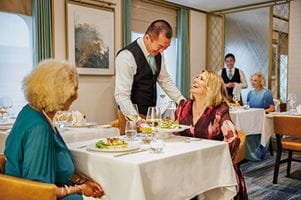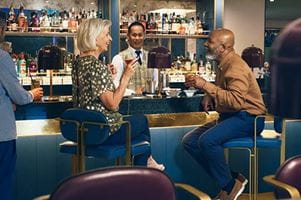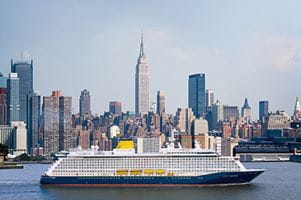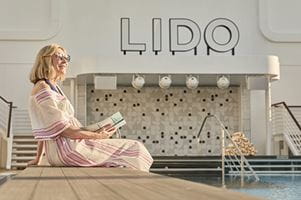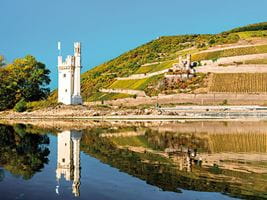Travel advice
River and ocean cruises, what is the difference?
Thinking about trying a cruise? Choosing between a river cruise or ocean cruise can feel overwhelming at first, but fear not! Saga offers the best of both worlds…
A different way to see the sights

Saga has a long history in the UK travel industry, beginning in 1951 with a single hotel on the south-east coast. And for the past three decades, we have also offered cruising holidays to various destinations around the world.
This includes both ocean cruising and river cruising. But what is the difference between the two?
While both types of travel experience take place on the water, there are very distinct and offer a different way to see the sights.
What is a Saga river cruise?

A river cruise with Saga is an immersive adventure through some of Europe’s most beautiful landscapes and historic cities.
Unlike ocean cruises that sail vast open seas, river cruises glide along the serene waters of the region’s iconic waterways – including the Rhine, the Danube, the Main, the Moselle and the Douro.
On a river cruise, you are always closer to the land. This proximity to the riverbanks means you will enjoy scenic views at all times, and can disembark daily to explore the nearby towns and cities, vineyards, churches, museums and other historical landmarks.
Some of the destinations guests enjoy on our river cruises include Amsterdam, Budapest and Vienna, along with more fascinating places such as the Middle Rhine Gorge in Germany.
We have four river ships to choose from. These include our new bespoke ships, built exclusively for Saga guests – Spirit of the Rhine, Spirit of the Danube, and brand-new for 2025, Spirit of the Moselle.
These boutique, modern ships hold no more than 172 guests. Just enough to make sure everyone receives excellent service while enjoying the ship’s facilities in comfort.
To offer even more choice, we also offer cruises along the Douro in Portugal, aboard Douro Serenity. This ship is even smaller, holding just 126 guests.
What is a Saga ocean cruise?

Saga’s ocean ships are the beautifully boutique sister ships, Spirit of Adventure and Spirit of Discovery. Each ship holds no more than 987 guests – a fraction of the amount of most new-build ocean ships.
The itineraries on ocean cruises also cover much larger areas, usually several different countries. And each one departs from the UK ports of Dover or Portsmouth. This means they are the ideal choice if you would prefer not to fly.
On a Saga ocean cruise, you can choose from shorter trips around the British Isles, a week sailing the fjords of Norway, and longer island-hopping adventures to the Canaries, Mediterranean or the Caribbean.
As you will be crossing oceans, these cruises often include some ‘days at sea’ as you sail to the next exciting new destination.
These sea days are a big part of the ocean cruise experience. You can use them to totally relax – think a spa treatment, sunbathing by the pool or attending a show or lecture. But they can also be very active – such as a gym session, fitness class, craft activities or a walk around the open decks.
The choice is always yours, and the ocean ships are packed with facilities to keep you occupied. They are very much like a destination themselves, with something new to discover every day.
What is the difference between a river ship and an ocean ship?

Of course, there are some major differences between river and ocean cruises.
River cruises take place on smaller river ships. These offer one main restaurant, and on our boutique ships, one smaller ‘speciality’ restaurant. On these ships, the Middle and Upper deck cabins have a French balcony. There is a spacious bar, and a sun deck and splash pool to enjoy the fresh air and outside space, and other facilities such as a small library and fitness area.
River cruises are more port-intensive – visiting one or sometimes two places a day. You can set off to explore on foot, or on guided tours, and often go ashore in the evenings too – as the ship is usually close to a main town centre.
Meanwhile, our boutique ocean cruises take place on larger ships, but ones that are still very much ‘boutique’ and offer lots of space along with wide, open decks.
On these ocean ships, every cabin has a balcony as standard. There is also a wider choice of accommodation, including larger, deluxe cabins, right up to expansive suites with separate living and dining areas.
Both Spirit of Adventure and Spirit of Discovery offer a choice of five different restaurants – two main ones and three smaller speciality venues – and all are included in the price.
Our ocean ships also offer a West End-style theatre, the large Britannia Lounge for more entertainment, a luxurious free-to-use spa, plus many other bars, lounges and spaces inside and out where you can relax, unwind and join included activities.
And what is the same?

So, it is clear the two types of cruising have some differences.
But, when booking a cruise with Saga, some things are very similar. Especially when it comes to value and what is included in the price.
Firstly, all of Saga’s cruises are all inclusive. This means from the moment you step aboard the ship, all of your meals and drinks are included. This includes a package of complimentary wines, beers, spirits, mixers, soft drinks, as well as hot beverages such as tea and coffee.
Dining in the main ship restaurant and speciality venues is also included in the price when you cruise with Saga.
You can simply sit back, and enjoy all the delicious food and choice of drinks – with no big bill at the end of each mealtime!
Other things you do not have to worry about include on-board Wi-Fi, port taxes, and gratuities (or ‘tips’) to on-board staff. Whichever Saga cruise you choose, these are always included.
Every Saga cruise – both river and ocean – also include a number of excursions in the price. Another great money saving.
Saga’s cruises also include a return UK travel service. This means wherever you are on the UK mainland, we will send a chauffeur to pick you up from home, and take you to your departure point. This is a really great inclusion, one that gets every cruise off to a great start – with no stress – and a fantastic way to end your holiday too, being driven back home again.
Many of these things are often charged extra by other cruise lines. So it is always worth doing a little research. Do not be tempted by a lower price in a brochure or on a website – check to see how much you will actually spend overall, on drinks, excursions, travel to the port, gratuities and Wi-Fi.
You might be surprised by just how good value every Saga cruise really offers.
Saga cruises are always an exclusive experience

Last but by no means least ¬– every Saga cruise is exclusive to travellers over 50.
This means you will be sailing with a discerning group of like-minded guests, with all the facilities and entertainment designed with you in mind.
Every ship is exclusive to Saga guests – all of our river and ocean ships.
And you can rely on Saga’s exceptional standards of service from the moment you book, until you return home from your cruise, full of exciting travel memories and adventures.
Which type of cruise should I choose?
It is a totally personal decision!
For a more port-intensive experience, seeing lots of sights every day, a river cruise could be perfect.
Or if visiting more destinations in several different countries – with a day or two at sea in between to relax – is more like you, perhaps you would love a boutique ocean cruise.
If you really cannot decide, why not try both? You can book shorter five-night cruises on both river and ocean ships with Saga. These are great ‘taster’ experiences to see which type of cruising is best for you.
Whatever you decide, happy sailing!
The opinions expressed are those of the author and are not held by Saga unless specifically stated.
The material is for general information only and does not constitute investment, tax, legal, medical or other form of advice. You should not rely on this information to make (or refrain from making) any decisions. Always obtain independent, professional advice for your own particular situation.
